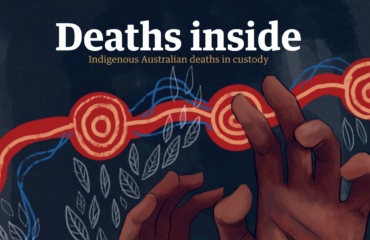Late on the evening of Tuesday 13 October, Shepparton cafe owner Leanne Stride received an unexpected call.
It was a nurse from the local Goulburn Valley Health service ringing to say that one of the regulars at Stride’s cafe had tested positive for COVID-19.
From that moment, it was “all panic”, she recalls. But that description doesn’t quite capture what was achieved over the next crucial days in the regional centre, a template for citizens, businesses and health officials as the Melbourne metropolis opens up from its long pandemic sleep.
First thing the next morning, Stride and her staff at the Lemon Tree Cafe hit the phones, calling the hundreds of phone numbers they had collected from customers over the previous week.

Leanne Stride, owner of Shepparton’s Lemon Tree Cafe, found herself at the heart of a successful public health campaign which doused a potential regional coronavirus outbreak. Image: Supplied
Businesses throughout Shepparton and the wider Goulburn region were doing the same as three positive cases in the regional Victorian city triggered a contact tracing and testing blitz.
With not a single further case founder and more than 7000 people tested in the Shepparton region in the month afterward, experts highlighted “phenomenal” community vigilance and record-keeping as a key to controlling the outbreak.
The community response to the Shepparton outbreak showed that contact tracing works when businesses keep good contact records, says University of Melbourne biosecurity expert Professor Andrew Robinson.
“[They] saved us from a third wave in regional Victoria”.
But as cafes and restaurants enjoy a return to business in Melbourne, Robinson says he is concerned about customers and business owners not taking record keeping requirements seriously.
“If people feel wary about giving their details, then I think they need to keep in mind that the alternative is to have no cafes,” he says.
Victoria’s Chief Health Officer, Dr Brett Sutton, has echoed this line, encouraging a sense of collective responsibility for controlling future outbreaks and urging Victorians to “vote with your feet” and not patronise venues that don’t follow the rules.
It’s an appeal that applies doubly to high-risk businesses like gyms, which were cleared to begin phased operations in Melbourne on 9 November. These businesses can also learn from the experiences of regional gym operators who have been allowed to operate since 27 October.

Bendigo gym owner Emma McDowall, now with over a month of experience managing risks, says it’s vital that Melbourne gyms drum the new rules into their members.
“If members understand what’s going on, and why you’re doing it, they’re really good.”
McDowall had just 48 hours to prepare for reopening after the Premier announced indoor exercise would be allowed in regional Victoria from October 27.
She rearranged equipment and introduced a booking system to allow for the new requirements, which only allow 10 people to exercise in a room.
Despite the changes, McDowall said gyms were in the “sweat business” and were used to strict hygiene rules.
“We’re the only business I know of where our customers walk around with sanitation bottles and clean,” she said.
“You don’t see that in a supermarket or café.”
She says that, with card scanning and CCTV systems in place, gyms already had an effective system for contact tracing.
But she worries the restrictions on numbers and the cost of having a “COVID marshal” at all times will be “a massive roadblock” for smaller gyms – especially for those that offer 24/7 access.
While scanning in is nothing new for gym goers, they might have to get used to digital check-ins when they visit other businesses, too.
Victorian Premier Dan Andrews has announced that the Victorian Government was building a QR (quick response) code check-in system that would be the “best in the country”.
But businesses across Victoria and Australia have been using digital check-in systems for months.
Shepparton café owner Ingrid Thomas says a QR code system was easier for her customers to use and reduced the likelihood of misinterpreting bad handwriting.
While the Fryers Street Food Store was closed during the Shepparton outbreak, she says it was easy to download customer contact information when they needed to.
She says businesses in regional and metropolitan Victoria shouldn’t wait until there is a scare to seek help from authorities.
“If you’ve got concerns about your workstation or how you’re keeping your records it’s best to ask those questions upfront.”
WorkSafe and health inspectors aren’t there to “throw the book at you”, she says. “You can ask the hard questions and they’ll give you the honest answer.”
“They’re there very much to help.”
The government’s ability to control future outbreaks will come down to how seriously the community takes contact tracing and testing, according to Shepparton-based University of Melbourne rural health expert, Professor Lisa Bourke.
“We’re really not sure when this virus is going to end, we really do need a long-term plan and embedded in that plan is a sense of personal responsibility.”
All staff from the Lemon Tree Cafe tested negative for COVID-19 and the café reopened on Monday 19 October, six days after their brush with the virus. Owner Leanne Stride had some advice for businesses in Melbourne returning to full scale operation.
“Get your customers numbers and details so that if something like this does happen you can get in contact with them straight away.
“Thank goodness we did that.”




